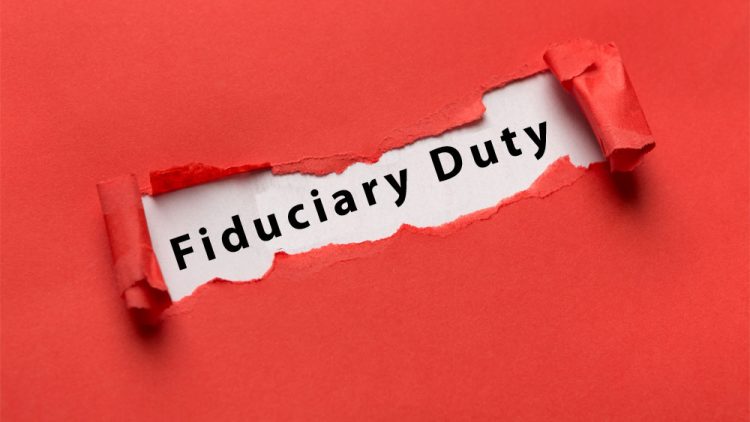Fiduciary Relationship
A similar fiduciary duty can be held by corporate directors, as they can be considered trustees for stockholders if on the board of a corporation, or trustees of depositors if they serve as the director of a bank. Specific duties include the following:
Duty of Care
Duty of care applies to the way the board makes decisions that affect the future of the business. The board has the duty to fully investigate all possible decisions and how they may impact the business. If the board is voting to elect a new chief executive officer (CEO), for example, the decision should not be made based solely on the board’s knowledge or opinion of one possible candidate; it is the board’s responsibility to investigate all viable applicants to ensure that the best person for the job is chosen.
Duty to Act in Good Faith
Even after it reasonably investigates all the options before it, the board has the responsibility to choose the option that it believes best serves the interests of the business and its shareholders.
Duty of Loyalty
Duty of loyalty means the board is required to put no other causes, interests, or affiliations above its allegiance to the company and the company’s investors. Board members must refrain from personal or professional dealings that might put their own self-interest or that of another person or business above the interest of the company.
If a member of a board of directors is found to be in breach of their fiduciary duty, they can be held liable in a court of law by the company itself or its shareholders.
More Examples of Fiduciaries
Fiduciary Relationship Between Executor and Legatee
Fiduciary activities can also apply to specific or one-time transactions. For example, a fiduciary deed is used to transfer property rights in a sale when a fiduciary must act as an executor of the sale on behalf of the property owner. A fiduciary deed is useful when a property owner wishes to sell but is unable to handle their affairs due to illness, incompetence, or other circumstances, and needs someone to act in their stead.
A fiduciary is required by law to disclose to the potential buyer the true condition of the property being sold, and they cannot receive any financial benefits from the sale. A fiduciary deed is also useful when the property owner is deceased and their property is part of an estate that needs oversight or management.
Fiduciary Relationship Between Guardian and Ward
Under a guardian/ward relationship, the legal guardianship of a minor is transferred to an appointed adult. As the fiduciary, the guardian is tasked with ensuring the minor child or ward has appropriate care, which can include deciding where the minor attends school, that the minor has suitable medical care, that they are disciplined in a reasonable manner, and that their daily welfare remains intact.
A guardian is appointed by the state court when the natural guardian of a minor child is not able to care for the child any longer. In most states, a guardian/ward relationship remains intact until the minor child reaches the age of majority.
Fiduciary Relationship Between Attorney and Client
The attorney/client fiduciary relationship is arguably one of the most stringent. The U.S. Supreme Court states that the highest level of trust and confidence must exist between an attorney and a client—and that an attorney, as fiduciary, must act in complete fairness, loyalty, and fidelity in each representation of, and dealing with, clients.
Attorneys are held liable for breaches of their fiduciary duties by the client and are accountable to the court in which that client is represented when a breach occurs.
Fiduciary Relationship Between Principal and Agent
A more generic example of fiduciary duty lies in the principal/agent relationship. Any individual person, corporation, partnership, or government agency can act as a principal or agent as long as the person or business has the legal capacity to do so. Under a principal/agent duty, an agent is legally appointed to act on behalf of the principal without conflict of interest.
A common example of a principal/agent relationship that implies fiduciary duty is a group of shareholders as principals electing management or C-suite individuals to act as agents. Similarly, investors act as principals when selecting investment fund managers as agents to manage assets.
Investment Fiduciary
While it may seem as if an investment fiduciary would be a financial professional (money manager, banker, and so on), an investment fiduciary is actually any person who has the legal responsibility for managing somebody else’s money.
That means if you volunteered to sit on the investment committee of the board of your local charity or other organization, you have a fiduciary responsibility. You have been placed in a position of trust, and there may be consequences for the betrayal of that trust. Also, hiring a financial or investment expert does not relieve the committee members of all of their duties. They still have an obligation to prudently select and monitor the activities of the expert.
Source
https://www.investopedia.com/terms/f/fiduciary.asp
Real Estate Expert Witness Services by Craig Cherney, Esc.
Craig Cherney is a trusted client advisor and a sought after real estate expert witness who is hired by the nation’s top Real Estate Litigation Attorneys to help resolve their litigated real property matters. Craig has appeared as a testifying expert witness before judges and juries in California, Arizona, Nevada and other jurisdictions across the country. Craig Cherney, Esq. Expert Witness Real Estate. 480-399-2342.
